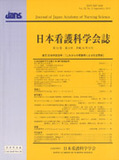Japanese
English
- 販売していません
- Abstract 文献概要
- 参考文献 Reference
- サイト内被引用 Cited by
要旨
目的:うつ病高齢者の生活世界に根ざした体験を明らかにし,抑うつを緩和するための看護への示唆を得ることである.
方法:うつ病と診断され精神科治療を受けている65歳以上の高齢者11名を対象に,非構成的面接を行い,Giorgiの科学的現象学的方法で分析した.
結果:6つのテーマが導き出された.うつ病高齢者は,過去の【負の記憶の重み】を抱えながら現在を生きており,さらに【老いによる喪失の重み】【抑うつを伴う身体症状からの脅かし】【他者との相互作用から起こる自己の存在価値の低下と孤独】という老いを生きることに基づく苦しみを体験することで抑うつを深めていた.これらの体験は全て【死の強い意識化】につながっており,それによってさらに抑うつが増強するという悪循環が生じていた.一方では,他者や世界とのつながりが実感できることで【生きる力の再生】を体験し,抑うつを緩和することができていた.
結論:うつ病高齢者の体験の基盤には,死にふれて生きることや人としての尊厳が脅かされやすいことへの苦悩があることが考えられた.看護師は,うつ病高齢者が抑うつを抱えながらも【生きる力を再生】できるように働きかけることが重要である.
Abstract
Purpose: To clarify the lifeworld-rooted experience of the elderly with depression and to provide suggestions to alleviate their depression in nursing care.
Method: An unstructured interview of 11 elderly patients aged 65 or above diagnosed with depression and undergoing psychiatric treatment was carried out and analysis performed using the Giorgi scientific phenomenological method.
Results: Six themes were derived. Elderly people with depression were living with “the weight of past negative memories” and their depression had further deepened as a result of their experience of pain such as “the weight of loss due to old age,” “the threat of physical symptoms occurring with depression,” and “a decline in self-worth and loneliness caused from interaction with others” they had experienced stemming from old age. These experiences were all linked with a feeling of “becoming strongly conscious of death.” It was caused more vicious cycle of depression. On the other hand, the elderly subjects could revive their “zest for living” by being able to feel a connection with others and the world and their depression could be alleviated.
Conclusion: Anguish at having their dignity as a person easily threatened and living with the touch of death is thought to be at the foundation of the experience of elderly with depression. It is important for nurses to encourage a “zest for living” in elderly people living with depression in spite of their depression.
Copyright © 2012, Japan Academy of Nursing Science. All rights reserved.


